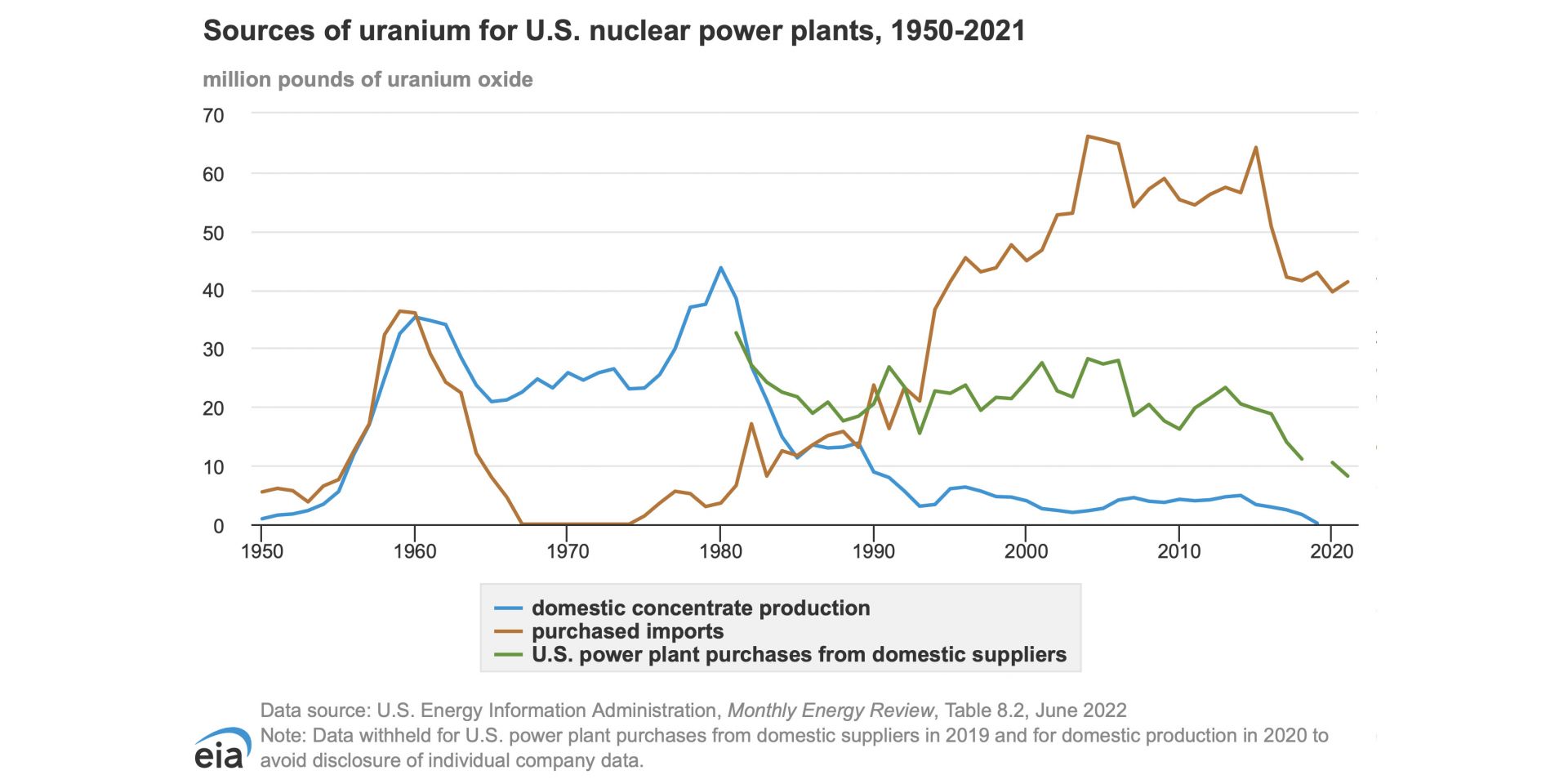The LENOWISCO region of Virginia, being considered for future SMR siting, is in the far southwestern corner of the state. (Image: Virginia.gov )
Seven sites in southwestern Virginia have been identified as “competitive hosting grounds” for small modular reactors by a feasibility study Dominion Engineering, Inc. (DEI) prepared for the LENOWISCO Planning District Commission. (The planning district, based in Duffield, Va., serves the counties of Lee, Wise, and Scott and the city of Norton.) At a May 22 press conference at LENOWISCO’s offices, DEI chemical engineer and principal investigator Chuck Marks said the review represents the “very early stages of, does this region have what it takes to site one of these reactors, successfully deploy and successfully operate. And the answer is overwhelmingly yes,” according to an article in the Cardinal News.
The Southern Nuclear Plant Vogtle team members showed off their first-prize winnings of golf balls and beer mugs at the banquet held after the CNTA Charity Golf Tournament. (Photo: CNTA)
Thirty teams of players participated in the 21st annual Citizens for Nuclear Technology Awareness (CNTA) Charity Golf Tournament at the Houndslake Country Club in Aiken, S.C. The tournament, held on on May 12, raised net proceeds of about $23,000, which the nonprofit organization will use to educate the public about issues related to nuclear energy. In addition, more than $700 in donations were raised for the group’s community gift card program.
An Indian postage stamp commemorating the country’s first nuclear reactor at Trombay. (Source: Government of India)
Reuters has reported that India is considering the recommendation of a government panel to overturn the nation’s ban on foreign investment in the domestic nuclear energy industry. The panel—established by think tank Niti Aayog, which is headed by Indian prime minister Narendra Modi—also recommended that policies be revised to allow for greater participation by private Indian companies in the nuclear energy industry, which is currently dominated by the Nuclear Power Corporation of India and Bharatiya Nabhikiya Vidyut Nigam, both of which are wholly owned by the government of India. The panel made these recommendations, according to Reuters, so that “both domestic and foreign private companies can complement nuclear power generation by public companies.”
A gypstack in Fort Meade, Fla., the current waste disposal means for phosphogypsum. (Photo: Harvey Henkelmann)
A recent NPR article has reported that Florida legislators have sent a bill to Gov. Ron DeSantis that would require the state’s Department of Transportation to study the use of a radioactive waste material in road paving projects.
The three winners of NASA’s Power to Explore Student Writing Challenge, are, left to right, Luca Pollack, Rainelle Yasa, and Audrielle Paige Esma. (Image: NASA/Kristin Jansen and Gayle Dibiasio)
Three winners have been announced in NASA’s Power to Explore Student Writing Challenge, in which U.S. students in kindergarten through 12th grade could participate by writing about imaginary space missions using radioisotope power systems (RPSs). Out of almost 1,600 submitted entries, 45 semifinalists, and nine finalists, Luca Pollack of Carlsbad, Calif. (in the K–4th grade category), Rainelle Yasa of Los Angeles, Calif. (in the grades 5–8 category), and Audrielle Paige Esma of Wildwood, Fl. (in the grades 9–12 category) snagged the top prize in their age groups. The April 25 announcement by NASA includes links to the winning essays.
This chart from the EIA shows sources of uranium for U.S. nuclear power plants, 1950-2021. In 2020, according to the chart, 39.60 million pounds of uranium oxide was imported for the domestic nuclear power plant fleet. (Credit: Energy Information Agency)
The naturalist John Muir is widely quoted as saying, “When we try to pick out anything by itself, we find it hitched to everything else in the Universe.” While he was speaking of ecology, he might as well have been talking about nuclear fuel.
At the moment, by most accounts, nuclear fuel is in crisis for a lot of reasons that weave together like a Gordian knot. Today, despite decades of assertions from nuclear energy supporters that the supply of uranium is secure and will last much longer than fossil fuels, the West is in a blind alley. We find ourselves in conflict with Russia with ominous implications for uranium, for which Russia holds about a 14 percent share of the global market, and for two processes that prepare uranium for fabrication into reactor fuel: conversion (for which Russia has a 27 percent share) and enrichment (a 39 percent share).
Pictured at the DOE's EM headquarters, from left, are Ana Han, foreign affairs specialist, EM International Program; Joceline Nahigian, director, EM Office of Intergovernmental and Stakeholder Programs; Scott Whiteford, deputy director, DOE Office of Legacy Management; William “Ike” White, EM senior advisor; Masaki Nakagawa, special advisor to executive directors, NDF; Tokuhiro Yamamoto, executive director, NDF; Shin Morita, managing director, International Affairs Group, NDF; Taro Hokugo, managing director, International Affairs Group, NDF; Jeff Avery, EM principal deputy assistant secretary; Angela Watmore, deputy assistant secretary, EM Office of Acquisition and Project Management; and Ming Zhu, EM senior advisor for laboratory policy. (Photo: DOE)
Representatives from the Japan Nuclear Damage Compensation and Decommissioning Facilitation Corporation (NDF) recently visited the Department of Energy's Office of Environmental Management (EM) headquarters in Washington, D.C., and the Hanford Site in Washington state to promote collaboration and provide updates on the status and plans to decommission Japan's Fukushima Daiichi nuclear power plant. The Great East Japan Earthquake of March 11, 2011, caused damage to the plant and surrounding communities. The NDF was created in September 2011 to oversee the decommissioning and cleanup of the plant, which is owned by the Tokyo Electric Power Company.
The University of North Texas, one of the NRC grant recipients. (Photo: Michael Barera)
The Nuclear Regulatory Commission has announced its Minority-Serving Institutions Grants Program (MSIG) awards for fiscal year 2023. Four institutions were granted a total of $997,943: University of North Texas ($400,000 for fellowships), University of Central Florida ($397,943 for fellowships), University of Nevada–Las Vegas ($100,000 for scholarships), and Virginia Commonwealth University ($100,000 for scholarships).
More details about the grants for this year will be posted on the NRC’s grant awards website, where recipients of awards from previous years can also be seen.


-3 2x1.jpg)






 Citizens for Nuclear Technology Awareness
Citizens for Nuclear Technology Awareness
 Academy Award–winning director
Academy Award–winning director 



.jpg)